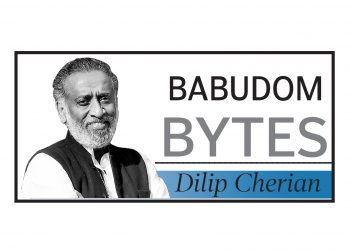A coalition alliance government creates its own special dynamics, which affects the bureaucracy uniquely. In Maharashtra, which has a three-party alliance, this was seen when the 1985-batch IAS officer Sitaram Kunte was named the state’s new Chief Secretary. Sources say that Kunte was ignored by the previous BJP government during whose tenure he was commissioner of the Brihanmumbai Municipal Corporation (BMC).
His fortunes changed for the better in the Shiv Sena-led government of Chief Minister Uddhav Thackeray. However, while the Chief Minister and the Congress party were said to be keen on his appointment, the National Congress Party’s chief Sharad Pawar was reportedly less enthusiastic, initially. However, Kunte managed to make it to the top post, although he snuffed the chance of his batch mate Praveen Pradesh, who was widely expected to be appointed to succeed Sanjay Kumar.
Pradesh had even returned from the UN in the hope of becoming the new chief secretary. Kunte’s elevation has led to the appointment of MK Srivastava, a 1986-batch IAS officer, in his previous office of Additional Chief Secretary for Home.
Mind the ‘S’ word
A communiqué issued by TM Yanthan, commissioner and secretary to Nagaland Governor RN Ravi, to Chief Secretary J Alam, has directed the state government to warn officials that they could face penal and disciplinary action if they post “seditious or subversive content” on social media. Apparently, it had come to the notice of the Governor’s office that “some government servants are indulging in seditious and subversive writings challenging the territorial integrity and sovereignty of the country” on social media platforms.
Sources say that a copy of Yanthan’s letter has been also marked to Union Home Secretary Ajay Kumar Bhalla. This suggests, they say, that the Governor has kept the Centre in the loop and may even have been directed by Dilli to take action against government officials posting seditious content.
Apparently, this is the second letter from the Governor’s office to the state Chief Secretary. Last year, he had directed the state government to prepare a database of state government employees’ family members and relatives who were in “underground organizations”.
However, ominous though it may sound, some observers feel that Ravi is merely reiterating the conduct rules for government servants and people should not read too much into this. Your thoughts?
Tenure row
Who has the authority to take a call on the posting of officers of the Director-General of Police rank in Haryana? This has become a point of contention between Haryana Chief Minister Manohar Lal Khattar and his Home Minister Anil Vij. The officer at the centre of it all is DGP Manoj Yadava, a 1988-batch IPS officer, reportedly handpicked by Khattar for the post.
It appears that Vij wants a change of DGP despite Yadava having over four years of service left. The minister recently directed Additional Chief Secretary (Home) Rajeev Arora to send a panel of officers to the UPSC to be considered for the next DGP. According to sources, once the minimum tenure of two years ends, the state government has the option of deciding to continue with the current DGP or replace the officer. In the present case, the government has extended Yadava’s tenure beyond February until further orders.
Sources say that Khattar is unlikely to seek a replacement for Yadava, who has done a long 15-year stint at the Intelligence Bureau (IB) before returning to his parent cadre. But Vij, say sources, is sticking to his stance.
Share a babu experience! Follow dilipthecherian@twitter.com. Let’s multiply the effect.



